His Highness the Sultan of Brunei Sir Omar Ali Saifuddin conferred the title of Pehin Bendahari China Kornia Di-Raja to Hong Kok Tin (方国珍) (1910-89) in 1960.
The title was bestowed on Mr. Hong earlier in the day by the Duli Pengiran Bendahara at the Surau di-Raja at the Istana Darul Hana. Among those present at the ceremony was the Duli Pengiran Pemancha, the State Secretary (Che Wan Ahmad), The Anttorney-General (Inche Ali bin Hassan) Pengiran Kerma Indra, the Chief Kathi (Pengiran Shahbandar) the Commissioner of Police (Mr. A.N. Outram) and heads of Government departments. This picture shows the new Pehin Bendahari China addressing the large gathering at the K.B.R.C.
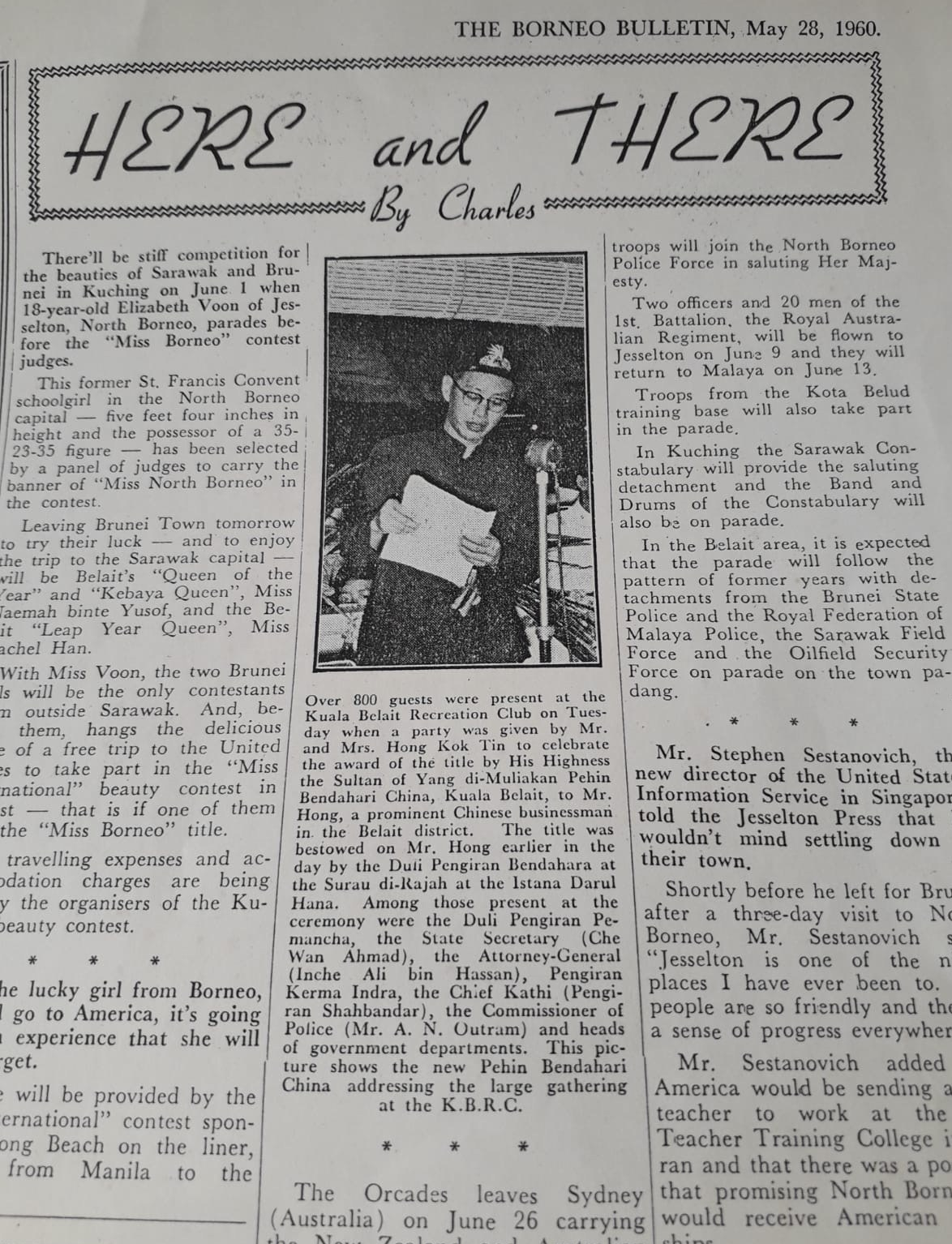
The Borneo Bulletin dated 28 May 1960 Here and There by Charles. This picture shows the new Pehin Bendahari China addressing the large gathering at the K.B.R.C.
Over 800 guests were present at the Kuala Belait Recreation Club on Tuesday when a party was given by Mr. & Mrs Hong Kok Tin to celebrate the award of the title, by His Highness the Sultan of Brunei Sir Omar Ali Saifuddin, of Yang di-Muliakan Pehin Bendahari China, Kuala Belait, to Mr. Hong, a prominent Chinese businessman in the Belait District.
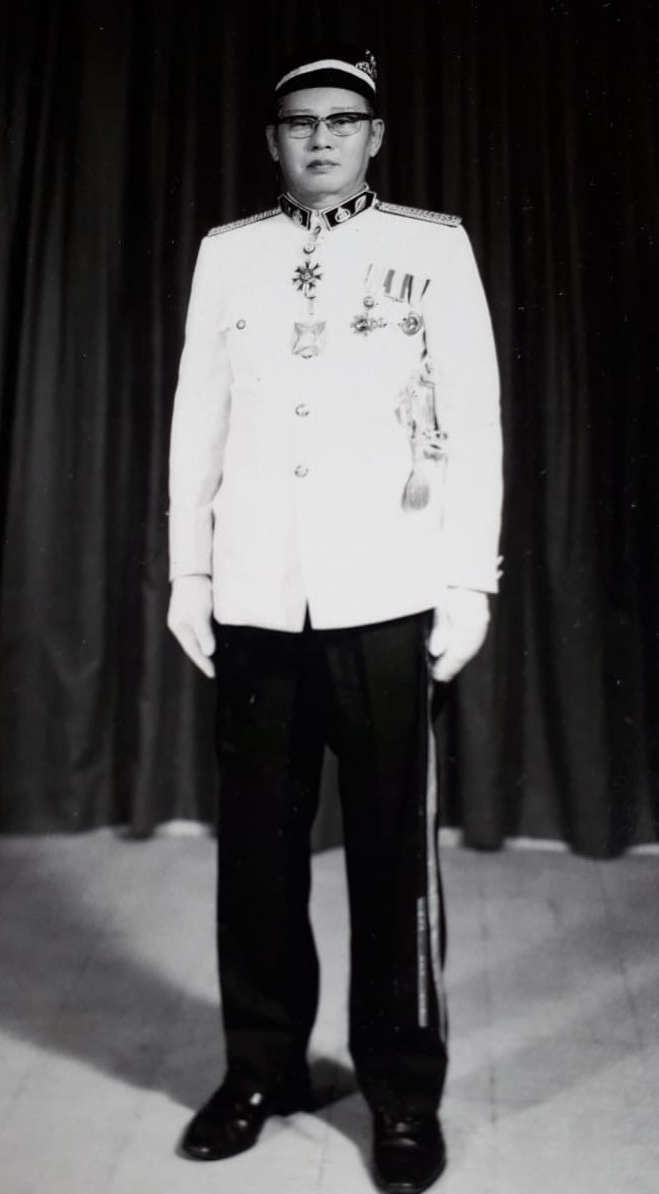
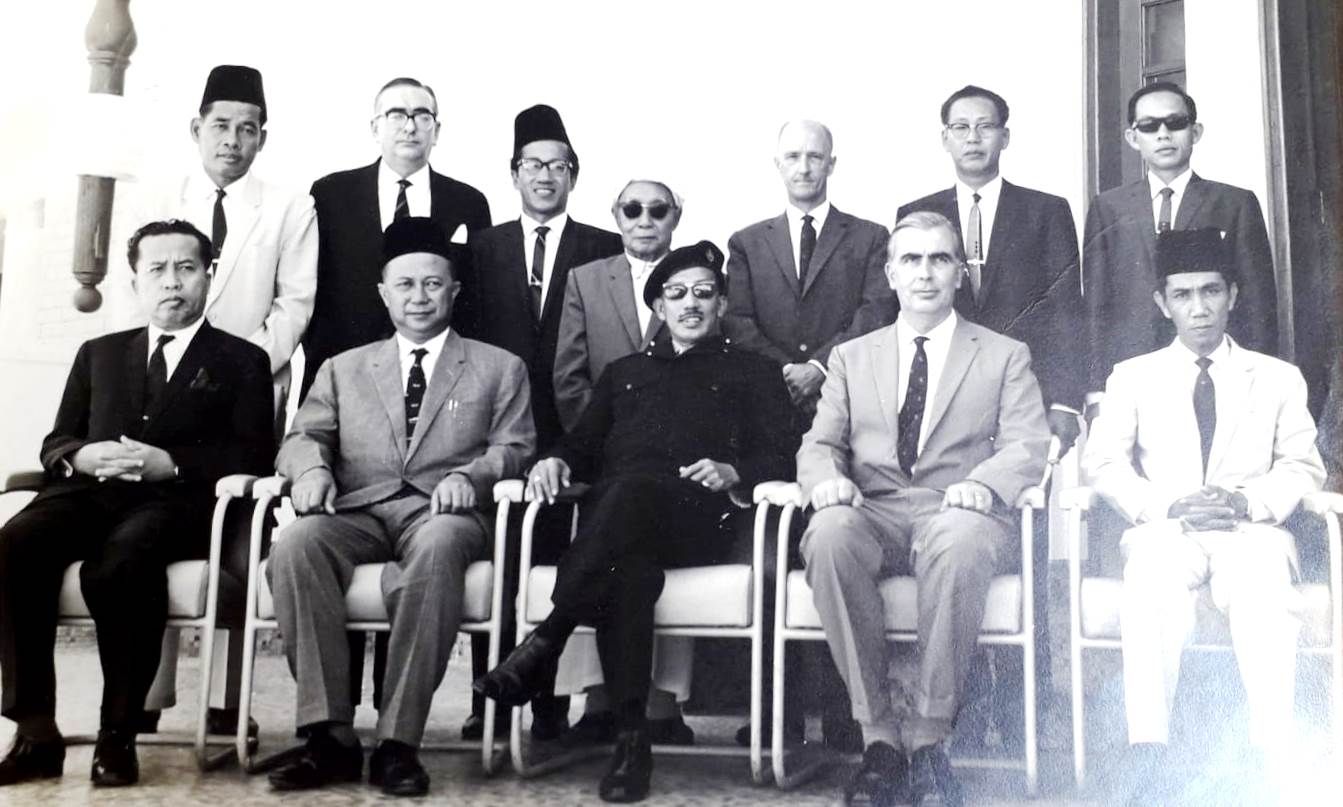
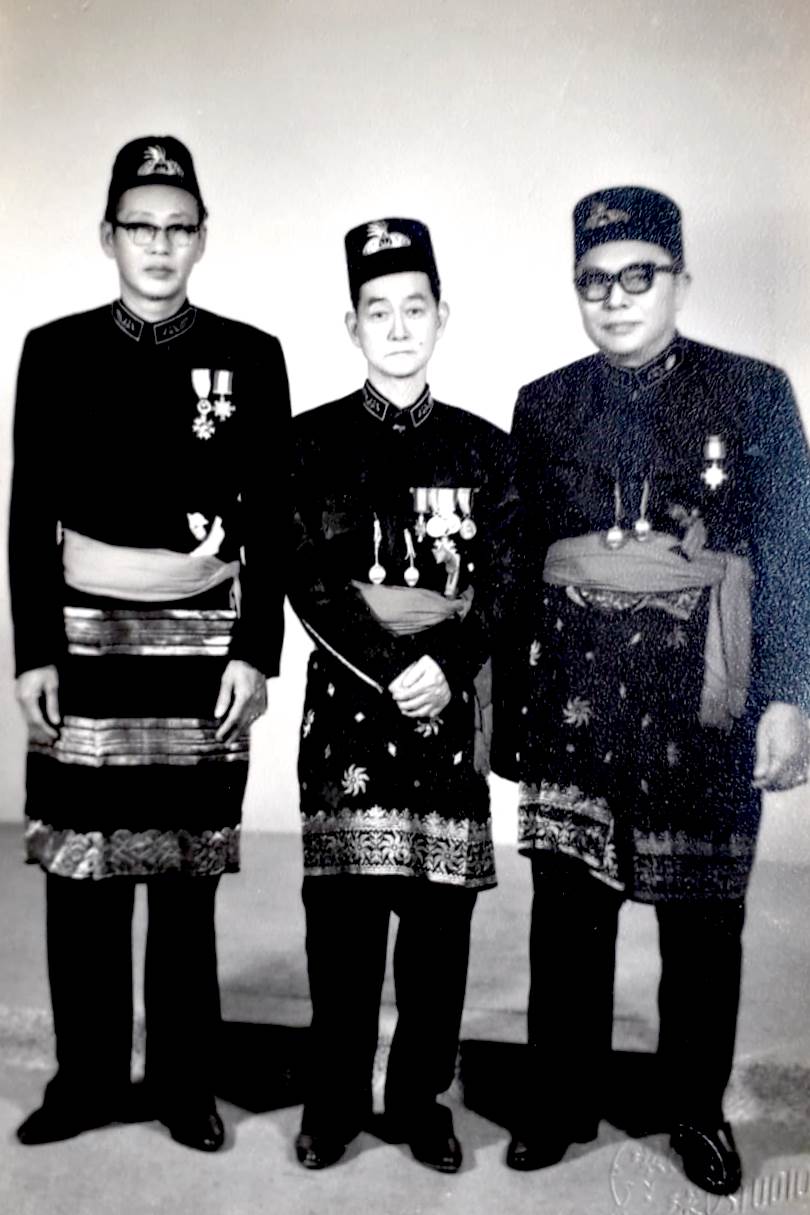
Pehin kapitan Cina Kornia Di Raja Lim Teck Hoo林德浦 was promoted to the title”Pehin Datu Temanggong) in 1996
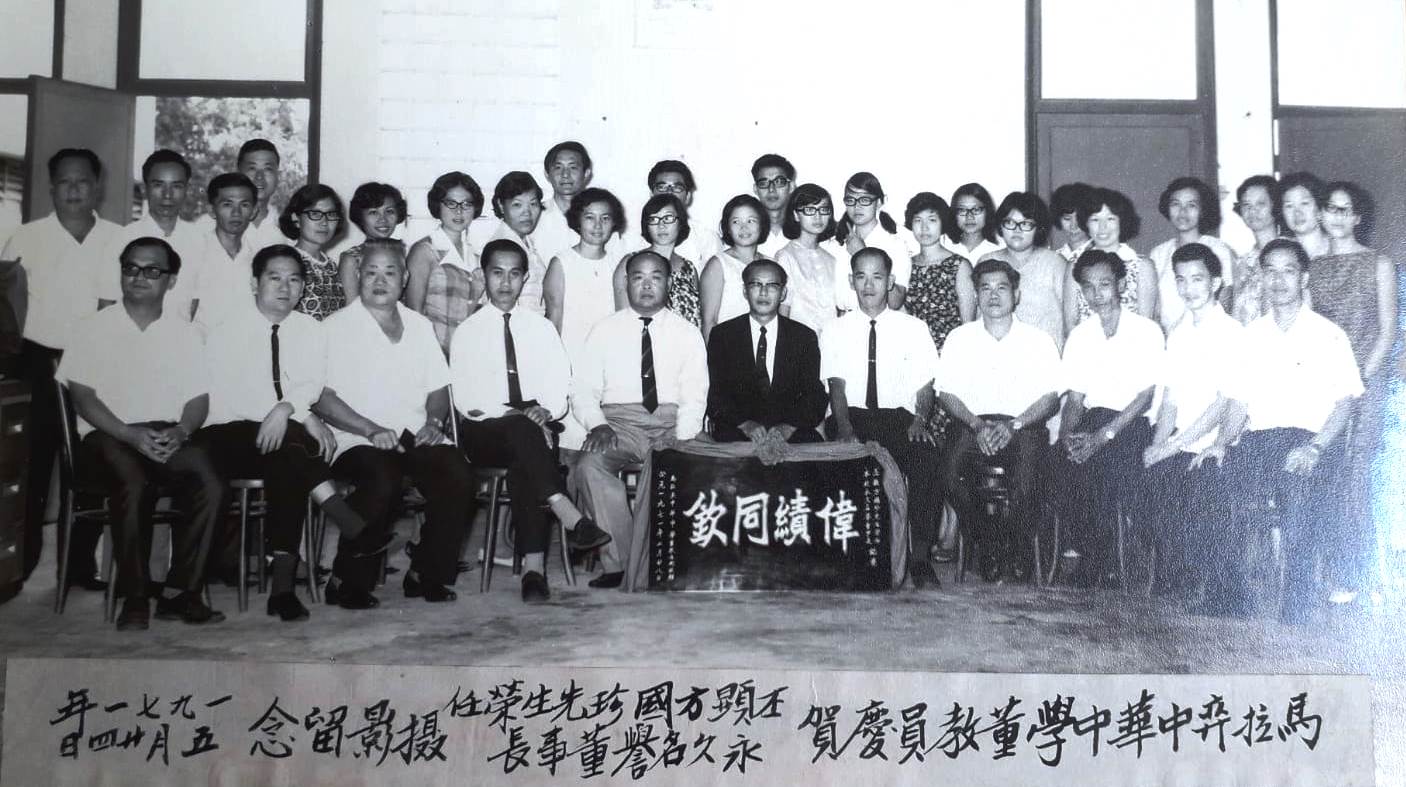
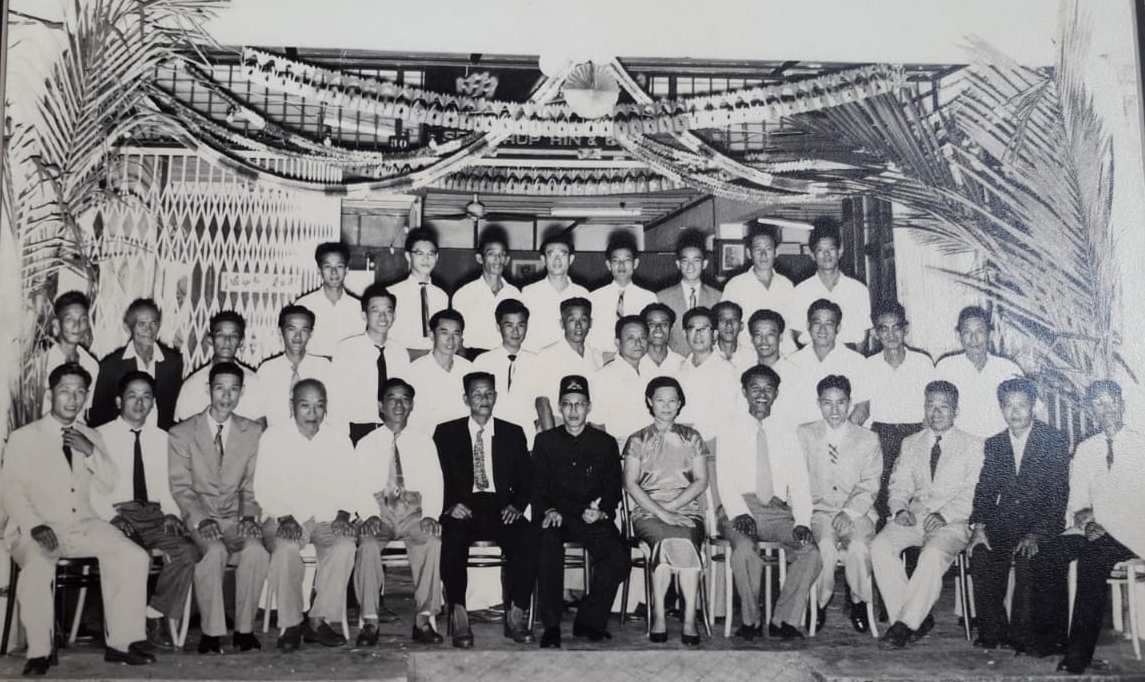
Prominent members of Heng Hua (兴化) Community in Brunei gathered together to celebrate Pehin Hong Kok Tin’s Royal recognition of his contribution to Brunei.
Hong Kok Tin ( 方国珍)(Pehin , businessman, civil servant, born in 1910 in Kuching, Sarawak d.1989 at Kuala Belait , Brunei Darussalam.
Hong Kok Tin had a humble beginning in Sarawak and rose to prominence in the neighboring state of Brunei, a British Protected State before 1984, now known as Brunei Darussalam, a fully independent State. He started as a successful businessman admired by many of his peers and folks and ended as one of the reputable leaders representing Chinese Community in the Royal Palace as well as in the Government of His Majesty, the Sultan of Brunei Darussalam.
The early part of his life covered his activities in Sarawak, first as an apprentice when he was thirteen years old, in a relative’s bicycle shop in Sibu earning, as he recalled vividly, $3 per month in the first year $5 the following year and $7 in the third year. Then years later, he traveled to Kuching, Miri, Labuan, changing jobs and exploring for opportunities to advance himself. His was the familiar story common to all Heng Hua folks from Putian District of Fujian Province, China, who ventured overseas seeking a change of fortune for the better. Finally in 1931, he set his eyes on Kuala Belait, then a fishing village rapidly expanding itself into an oil town to meet the needs of oil-field workers recruited by the then Malayan Petroleum Company ( predecessor of Brunei Shell Petroleum Co. Ltd.) after it discovered oil in Belait District in 1929. Miri found oil in 1910, and Hong Kok Tin witnessed how it boomed into a prosperous settlement, only some 30 kilometers away from Kuala Belait. He believed Kuala Belait too, in due course, would turn itself into a town, teeming with new immigrants and skilled workers recruited from countries nearby and even as far as Hong Kong, Penang, Singapore and other places. He decided to settle down in Kuala Belait and founded his first shop trading under the style of “Chop Seng Hup Hin ” selling bicycles and other imported goods. Business was brisk and promising for about three years until it was abruptly interrupted by Japanese occupation.
When the Japanese surrendered to the Allied Forces in 1945, the British Forces returned to Brunei resuming its rule under the British Resident. The British lost no time to start a program of rebuilding the devastated town and Shell followed suit recovering in full speed the refinery destroyed by fire at the hand of the retreating Japanese. According to Brunei Annual Report 1961-62, the population for the year 1947 was 40,657 of which 8,300 were of Chinese descent. By 1960, it grew to 84,515 of which 21,795 were Chinese, almost triple in the course of 13 years, no doubt due to heavy demand for workers from abroad. Hong Kok Tin, like all other shopkeepers, finding their shops were completely devastated by indiscriminate bombing carried out by Allied planes, had to start all over again from scratch, occupying temporary structures made of wood and palm leaves (“ atap”). He started his old trade of selling bicycles and sundries and at the same time, took a chance on transport business by investing in a fleet of lorries and engaging some twenty workers.
This sorry state of doing business in atap shops last till years later in 1953 when all shopkeepers moved into double storey concrete buildings, newly constructed by government at Jalan Pretty where they now situate. By 1960, Chop Seng Hup Hin was a well-known firm selling wide range of Philips products, to customers with increasing purchasing power thanks to income from oil production. It was so popular, it became a household name. In the words of one local big shot, in those days, a sole distributor for Philips products like radios and electrical appliances was as prestigious as a motor-trader franchised to sell Humber Hawk, Singer Gazelle ,Oxford, Holden and other prestigious saloon cars.”
In 1960, Hong kok Tin was appointed by the Sultan of Brunei Darussalam a position in His Royal Palace titled “ Pehin Bendarhari China Kornia Di-Raja”.
This was a grand and memorable occasion for Hong Kok Tin and the town folks of Belait District. It also marked the beginning of a new stage in his life pursuing fulfillment of dreams and ambitions.
In Brunei, it is a tremendous honor to receive such a title, especially for one hailing from the Chinese community, ( His appointment was the first resident of Belait District, another unprecedented record) . Holder of this title enjoys privileges, but not powers, unless he is also appointed as a member of any of the 5 powerful councils provided for under the recently promulgated Constitution 1959. In 1963, he was appointed a member of the Executive Council and that of the Legislative Council. Later, in 1965, he was appointed Deputy Minister of Health and housed in official residence in the Capital. From then on, Pehin Hong Kok Tin served his King and His Government whole-heartedly, loyally, steadfast until the end of his life.
The conferment of the title of Pehin on Hong Kok Tin, his membership of the Legislative Council and Executive Council and lastly his appointment as Deputy Minister of Health unmistakably amount to recognition of his selfless service and contribution to Chinese schools and associations in Brunei, whether during the Era of British Residence or thereafter during the period of Self-Rule beginning from 1959 until Independence in 1984. If peace, harmony and stability of Chinese communities had been maintained throughout the state, particularly in Belait District, through concerted effort of community leaders, his contribution was undoubtedly outstanding and significant!
Immediately after the war, building schools and providing education to children of school age, specially those over age were pressing matters confronting the British Resident. The British had then were more concerned with maintaining Brunei for strategic reason in their Far East venture and exploitation of its natural resources, than mainly crude oil. Education was a matter considered better to be sorted out by the British missionaries and local Chinese community leaders as in the days before the war. Soon after Japanese left, the Chinese community comprising Hockien, Hakka, Cantonese, Foo Chow and other clans put their heads together to revive the Kuala Belait CHUNG HUA SCHOOL at the same old building which miraculously survived the Allied bombing. On August 1945, a Management Committee was formed, Pehin Hong Kok Tin was elected a member along with other local prominent figures like Ng Seng Hup (黄成合), Shen Jen Shi (沈仁史), Niew Tze Lin (饶梓琳), Liu Tian Dai (刘天带), Tan Zhuo Hua (谭卓华), Liu Kong Lun (刘孔伦), Lai Ah Chee (黎亚以), Yuan Yun An (袁云安). and probably some others as well. The first ten years were led first by Ng Seng Hup for one term thereafter by Niew Tse Lin. In 1955 and the following year, Pehin Hong Kok Tin was elected Chairman of the School Management Committee. During the period under his leadership, the old semi-concrete pre-war building was demolished and in its place a modern, huge double storey concrete structure comprising Principal’s Office and Staff Rooms, and classrooms were erected with Government aid of B$80,000.00 , a huge sum in those days.

The construction which began in 1955 was completed the next year .It was officially declared open on the 27th Day of July 1956 by the late DYMM Seri Paduka Baginda Maulana Al-Sultan Sir Omar Ali Saifuddin Sa’adul Khairi Waddin amid pomp and ceremony greeting a royal visit. 1956 was a historic year, marked by a Royal visit, and new school building, (the biggest in Brunei and a landmark of Belait District), a boost of student population from about 600 in 1955 to almost 900. It was also in this very year, the Education Department granted its permission to allow the Chung Hua School to offer classes for secondary education, like the other Chinese Schools in the region. By 1959, when Pehin Hong Kok Tin was again elected as the chairman of the school , he had the satisfaction of witnessing the graduation of the school’s first batch of Lower Secondary students, an important milestone in the history of Chinese education of Belait District indeed!
By 1965, five years after his appointment as Pehin, he was again elected to chair the School’s Management Committee, at a time when the number of students exceeded one thousand, and available classrooms could hardly coup with the demand. Once more, Pehin Hong Kok Tin led his Committee to construct and completed in 1967 a second concrete building, rectangular shaped, two storey high and at a cost of Brunei Dollars 500 thousand only. In recognition of Pehin Hong Kok Tin’s tremendous contribution to the School its Management Committee on May 1971 unanimously voted to honour him as the School’s Permanent Honorary Chairman. On hindsight, without the care and effort of leaders like Pehin Hong, without a properly run private school, many children after the war would probably turn into street urchins, social misfits or outcasts, if not outright gangsters or members of black societies.
Apart from education, Pehin Hong was also actively involved in various clan organizations or associations. In the middle of 1950s, he was selected by the British Resident to serve in a body called Belait District Chinese Affairs Advisory Committee, set up by him to mobilize the local active elements to assist him in handling Chinese affairs and to make representations or to offer advice to him as may be necessary. This body had 10 members, the most articulate one was T.S.Sung, the famous principal of Chung Hua Middle School, Kuala Belait, a bilingual intellectual and a close associate of Pehin Hong .
( T. S. Sung was awarded the honour of M.B.E by Her Majesty,Queen Elizabeth II in 1956)

In 1951, when the de facto Kapitan-china Shen Jen Shi proposed the founding of Chinese Chambers of Commerce for Kuala Belait and Seria, Pehin Hong was the first to respond positively and by 1955 when it was formally established, he was registered as one of its founding promoters. Besides, he was also appointed honorary chairman or advisor to numerous other schools, clubs and associations.
Pehin Hong was a born leader, enterprising, good-nature, kind and generous, helpful to the needy irrespective of his or her racial or religious background. His character truly explains his popularity and his rise in society. His critics, however asserted that he failed to champion the cause of those so called “stateless” Chinese for citizenship who have been resident in Brunei since the rein of British Resident whether in the Executive Council or in the Legislative Council.
Pehin Hong received very little formal education. Though born in Nanyang, he followed his father to his ancestors’ birth-place, i.e. Putian at the age of five. He was educated in China until he was thirteen when he decided to venture abroad again, this time without the company of his father who passed away when he was ten years old. Several years later, with enough saving from his earning in bicycle shop, he returned to Putien to get married. His wife, madam Chai See Moi ( 蔡细妹) whose mother died when she was 5 and father too when she was 10, matched him just as well. The marriage produced 10 children, 7 sons 3 daughters, all received higher or tertiary or professional education, all outstanding and ambitious, except one son who chose to stay behind, keeping close company to parents. His acts of filial-piety is so touching, most Chinese in Belait District considered him genuinely Confucian and truly outstanding too.
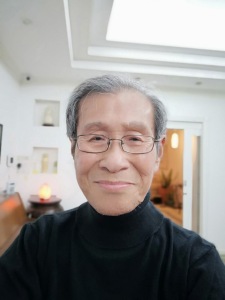
Biography:
- Brunei Annual Report 1961-62
- 汶莱马来奕中华中学75校庆纪念特刊2006 年
- 刘华源与王昭英合著:双飞集(Flying on both Wings ), .
Credit to :- Candid Creation Publishing LLP, 2006 Singapore Sunday, May 24, 2009
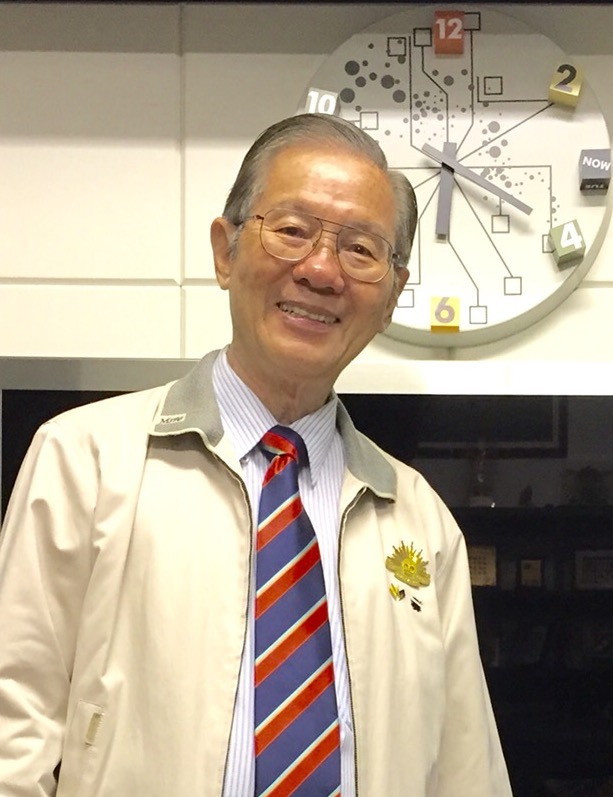
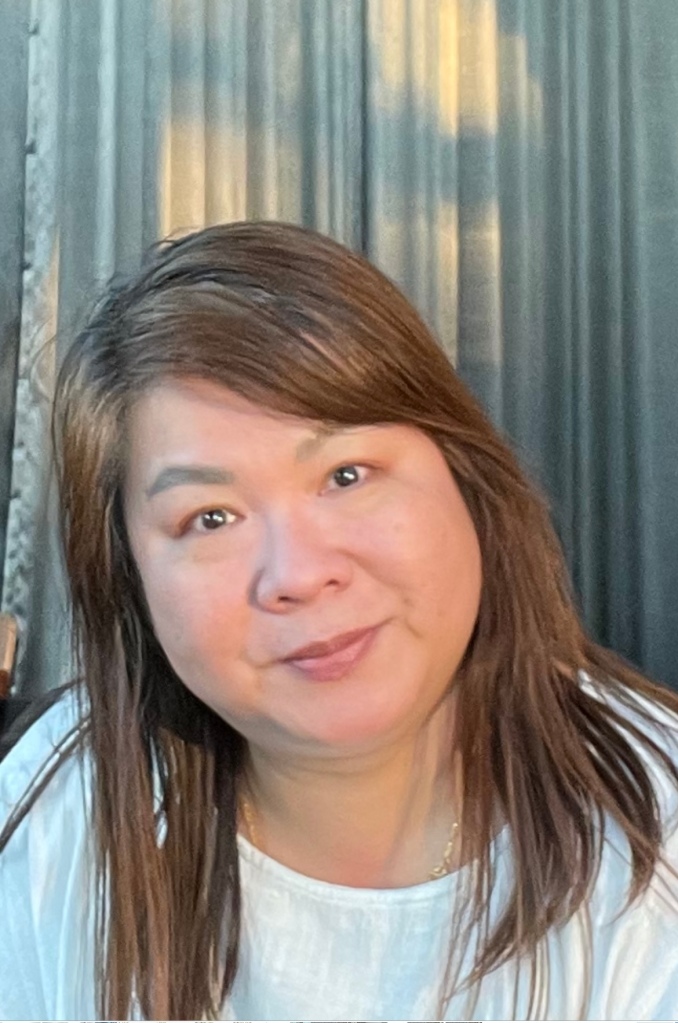
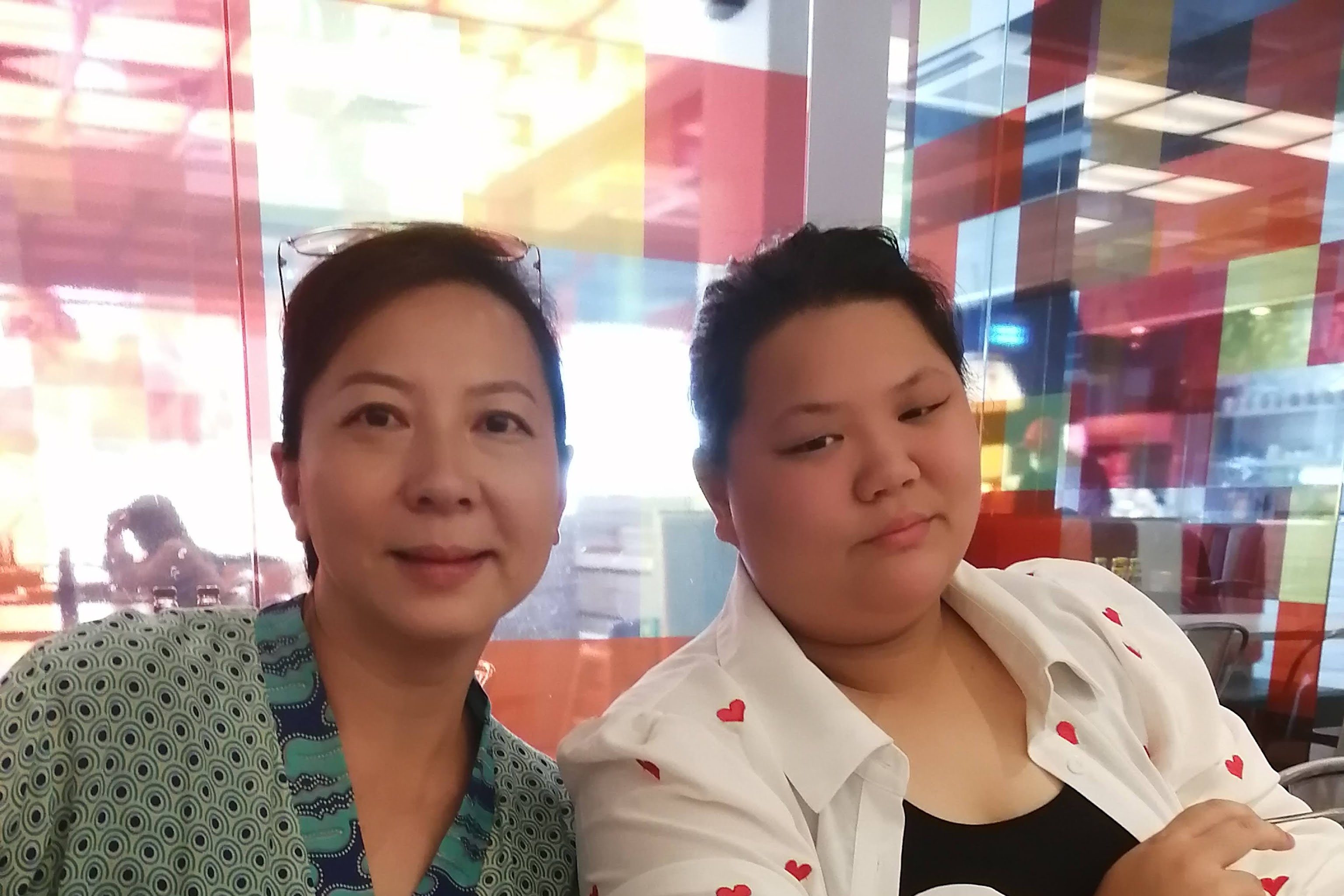


Reblogged this on KatChow.
LikeLike
It’s such pleasure to read about my grandfather. Like to thanks the two authors for finding time to write them.
LikeLike
We are delighted to hear from you, Mei Mei, that the late Pehin Hong Kok Tin方国珍 was your GrandFather! Do you have a family tree? I was given to understand that my wife’s father is related to Pehin as well! Coincidentally, the late Pehin Hong registered our marriage and issued the marriage certificate in 1964 at his office in KB. Pehin’s siblings and I attended the same primary school in KB. To know more about KB, please subscribe to our eBook at no cost. http://www.memoriesofthewaywewere.wordpress.com Hope to hear from you soon. Best regards. Chong See Kui.
LikeLike